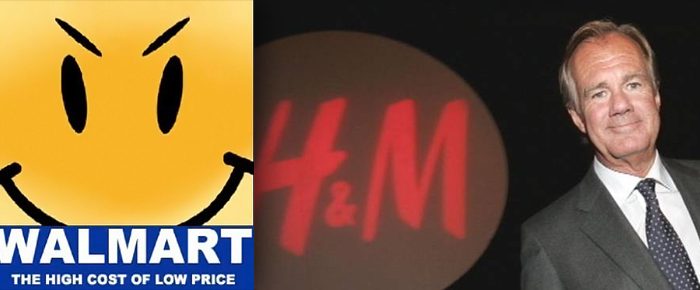
By Haddon Libby
In part three of this who-know-how-many part series on Corporate Cannibals, let’s acknowledge a few of the retailers who fit the description. As a reminder, Corporate Cannibals must have a history of doing things that are illegal or unethical against their consumers and/or employees. By knowing which businesses fit this description, you can make your own decisions as to whether to support these businesses by owning their stocks or shopping at their stores.
Let’s start with H&M. They have an ad campaign where they claim to be an ethical purveyor of “fast fashion” whatever that is. In truth, they represent many of the worst practices in the garment industry.
Stefan Persson, Sweden’s richest man, heads this family business. The Center for Research on Multinational Corporation calls out his company for supporting exploitative work conditions globally on 850,000 workers at the 1,800 factories that serve H&M. H&M factories are known for employing children and paying as little as 35 cents an hour. To reach an equivalent minimum wage in the United States would mean these workers would need to be paid at least $1.50/hour. H&M has said that they will reach this $1.50/hour number at about 60% of their factories by 2018. If this indifference toward humanity isn’t repulsive enough, in one high profile case, twenty-one workers at one of their Bangladesh factories died in a fire because they had been locked in the factory overnight in order to make quotas.
H&M has also been caught intentionally using organic cotton labels on their clothes when the fabric is not organic.
Scott Nova of the Worker Rights Consortium loudly criticizes H&M plans to improve conditions at a small subset of their factories as merely a publicity ploy. Real reform would eliminate exploitative work conditions and be accomplished on a much faster schedule.
While H&M is a poster child for poor corporate citizenry, the entire garment industry is known for worker exploitation.
In an industry littered with irresponsible companies, no list of Corporate Cannibals is complete without mentioning Walmart. Like H&Ms Stefan Persson, the Walton family is collectively the wealthiest family in the United States yet more of their employees are on public assistance than any other US company. Recent reports show that the U.S. taxpayer provides $1,000 per year in economic support to Walmart’s 1.3 million employees. That means that you and I pay $1.3 billion to subsidize Walmart labor practices. This happens despite Walmart producing $3 billion in pre-tax profits MONTHLY.
Walmart recently began an ad campaign touts plans to begin spending an additional $1 billion annually on training and wages over the next few years – about ten days of profits. For comparison, Walmart ad spending will top $2.5 billion this year – much of this touting the $1 billion increase in wages and training.
Not only does Walmart fail to pay many of their U.S. workers a fair wage but they use of foreign sweatshops like H&M. Domestically, Walmart practices are proven to cause local businesses that pay living wages to close. By eliminating better paying jobs at their competitors and staffing with a workforce that is heavily subsidized by government welfare programs, the communities that they serve have less money circulating in the local economy than before Walmart came to town.
While many of the actions of Walmart or H&M are done by other retailers, these two retailers are the best at poor corporate citizenry.
Please use this as a reminder to shop at locally owned and operated businesses whenever possible if you want to help improve our local economy.
Haddon Libby is Managing Partner of Winslow Drake, an investment advisory practice and co-founder of ShareKitchen. Haddon can be reached at hlibby@winslowdrake.com.









































